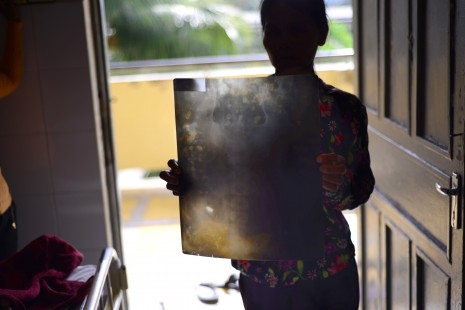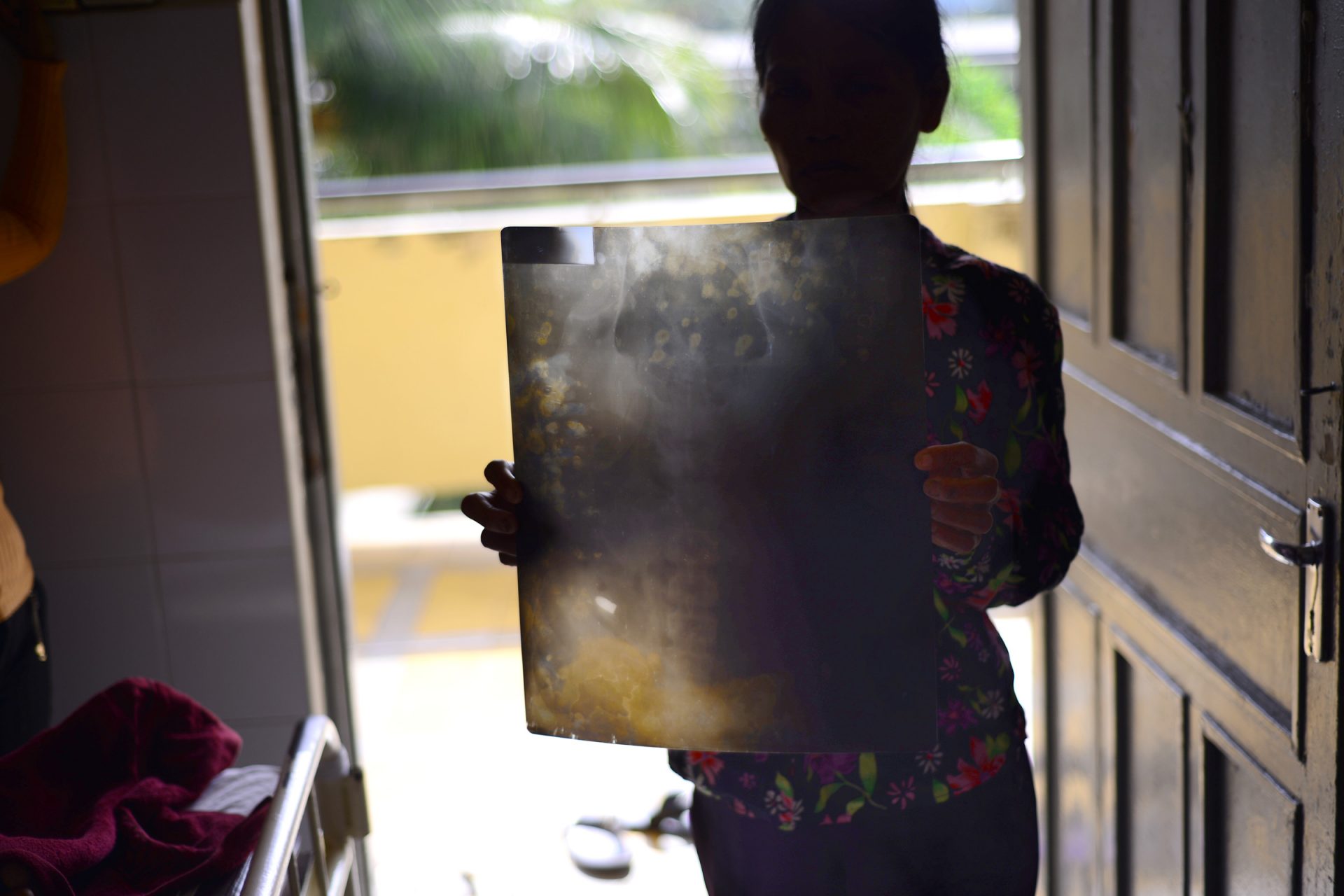Hoeurn Chann clearly remembers the moment a police officer shot him in his side at close range on November 12, irrevocably changing the course of his life.
The bullet, which X-rays show ultimately lodged in his abdomen, damaged his spinal cord, paralyzing him from the waist down.
He has been told he will never walk again.

“I was shot, and then I couldn’t feel my legs anymore,” the 26-year-old university student said from a bed in a small room in Phnom Penh’s sprawling Khmer-Soviet Friendship Hospital on Wednesday.
“I needed to use my hands to push myself up.”
Mr. Chann was shot following clashes between police and stone-throwers, which erupted during a protest by SL Garment Factory workers in Phnom Penh’s Meanchey district.
His abdomen is bandaged from the surgery he underwent to have the bullet removed. A small, grayish entrance wound on his left side belies the damage wrought by the single gunshot.
Mr. Chann’s sister pulled down his blanket, revealing that he has to wear an adult diaper as he no longer has control over his bowels or bladder. His legs are motionless; one of his toes, peeking from underneath the covers, has lost some of its color.
Of their limited grasp of English, “spinal” has become a terrifyingly oft-repeated word for members of Mr. Chann’s family.
They hold up X-rays taken of his lumbar vertebrae, or the lower part of the back. The bullet is a white mass on the otherwise dark image.
Mr. Chann’s universe, which used to include study and a sales job on the side, has been reduced to these four walls—which he describes as a fate worse than death.
“If I could walk again, it would be like being given a new life,” he said. “I just want to have another opportunity to walk again. I want the hospital to keep taking care of me. But if I am still lying here [in the future], it will be like my life is dead,” he said.
Mr. Chann said he had left his home, located behind the pagoda, earlier on the day of the garment worker protest, but he returned to retrieve some forgotten papers. Along with his brother, he stopped in the pagoda to look at the commotion.
Six police officers were trapped in a room there. An angry crowd milled about outside. When the officers were eventually freed with the help of human rights workers, one of the six drew his pistol and fired at Mr. Chann for no apparent reason.
“I would not recognize him, because he was in the middle of the six” police officers, Mr. Chann said.
Police have denied responsibility for killing street food vendor Eng Sokhom, 49, who was hit by police gunfire outside the pagoda on the same day, or any of the other shooting victims like Mr. Chann.
A police investigation into the use of live ammunition by their own officers during the clashes has yielded nothing so far, and human rights groups do not believe it ever will.
“I fear for his future,” the young man’s weeping mother Hoeurn Sakhan, 51, said at his bedside, and kept company by her other son, Hoeurn Choeun, 21, daughter Hoeurn Chantha, 28, and niece Eam Sophoan, 28.
“No one from the police has come to speak to us. We are suffering, because my son was almost finished university, but the authorities were freely shooting [at people],” she said.
Two Cambodia Daily journalists and human rights monitors witnessed riot police firing indiscriminately toward the crowd during the clashes last week.
While the police and government officials say an investigation is underway, victims of the police shooting said they have not been interviewed or asked any questions by an investigating body.
“We know in our country that we can try to get justice, but it will never work,” added Ms. Sophoan, Mr. Chann’s cousin.
“When he recovers, we will think about [filing a court complaint].”
Right now though, the focus is on whatever recovery is possible. Doctors have told them that any improvement could take some time.
Ms. Chantha said it is looking increasingly likely that the family, which is poor and makes a living from farming, will have to decide which of them has the time and means to care for Mr. Chann when he is released from the hospital.
A long stretch of recovery also awaits another shooting victim from the Meanchey district clashes. Speaking by telephone from his bed in Calmette Hospital on Wednesday, 33-year-old Chan Virak, a security guard with a private company, said he would need at least six months to recover from his injuries.
Mr. Virak said he had been on his way to Stung Meanchey Primary School when he was shot.
“I did not know that I had been shot—I just heard the sound zip into my body and a person standing by me told me that I was shot.”
Mr. Virak was first taken to Preah Kossamak Hospital before being transferred.
“The doctor told me that it would take six months for me to recover from my wound,” he said.
No one from the government and no investigators into the shooting visited him either, he said.
“They do not care about me,” Mr. Virak added.
Ty Sophanith, a 31-year-old SL worker, was shot through the leg and arm.
“The doctor told me that my leg was seriously injured, so I need to stay longer in the hospital—I do not know when I will get out of the hospital,” he said by telephone Wednesday from the Khmer-Soviet Friendship Hospital.
Mr. Sophanith also said that police had not thought to take his statement or question him about the circumstances of his shooting.
Adding to the victims’ physical concerns is the cost associated with their ongoing treatment and recovery. To that end, New Zealand national Francesca Eldridge, who is a currently living in Phnom Penh, said by email Wednesday that she is in the process of setting up a fund to which people can donate to assist the shooting victims.
Contacted Wednesday about the Meanchey district police shootings, Interior Ministry spokesman Lieutenant General Khieu Sopheak referred questions to National Police spokesman Lieutenant General Kirth Chantharith and municipal police chief Chuon Sovann, who could not be reached for comment.
Back in his hospital room, Mr. Chann can do nothing but wait. Asked what his overriding emotion was since his injury, Mr. Chann’s answer was simple.
“Regret,” he said.




